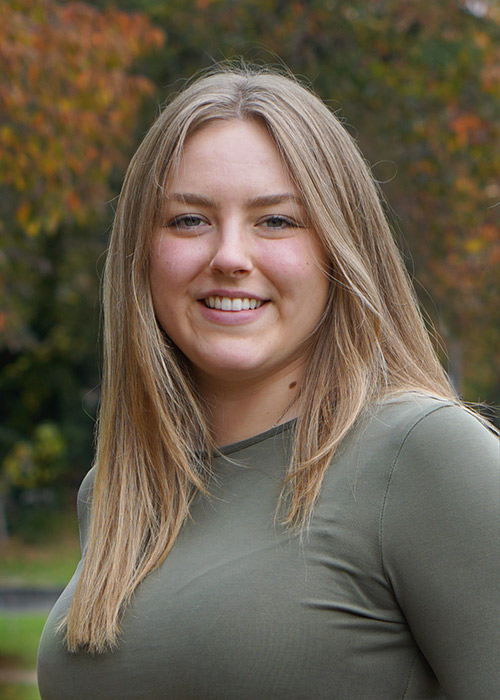
What influenced you to pursue a graduate degree in nutritional sciences?
I was a really picky eater growing up and I always felt left out of the cool kids’ club. What was it about food that everyone liked so much? Why was it so blasphemous that I didn’t like a lot of foods other people did? Luckily, as I matured, my palette expanded, and I learned the secret: food is incredible and so complex. It harbors culture, community, and health (however you define those words). This remained true for me whether I was living in the United States or abroad. This relationship to food and nutrition sparked something for me. If nutrition could be harnessed the right way – if there wasn’t so much misinformation and barriers to access it – there would be such great potential to use nutrition to improve the health and wellbeing of our population. Seeing the complexity of nutrition and how it intersects with so many different systems has been a major influence on me.
What drew you to UW?
Although I grew up in the Midwest, my mom’s side of the family lives in Oregon, so I grew up visiting the Pacific Northwest. I have loved this area for as long as I can remember. When I decided to pursue my graduate degree in nutritional sciences, UW quickly became my top choice. I was attracted to its well-recognized public health program and its focus area in nutrition. UW also has a large global health department, which was important to me because I would like to work globally. Additionally, the benefits of working as a teaching/research assistant at the university throughout my time here made it a smart financial choice, as well. However, what really sealed the deal is that when I started learning more about my potential schools, the folks at UW were the kindest, and that has remained true throughout my time here!
How do you see the importance of nutrition in public health and disease prevention?
I don’t think there is an area where I don’t see nutrition impacting public health and disease prevention. Food systems are complex and intersect with so much. Primarily, I see nutrition/food as power. It can both connect and divide communities. Proper nutrition has the power to heal and prevent disease, yet it isn’t accessible to all. Nutrition and food are key parts to many aspects of wellness – such as physical, emotional, spiritual, social, and environmental – which gives them so much potential and power to be changemakers in public health.
Tell us about your fieldwork/thesis?
With my fieldwork project I had the opportunity to collaborate with Slow Food International, working with their Earth Market team to help promote the relationship between farmers’ markets and public health. I supported a webinar for the Slow Food Community on the topic of markets and health, where we featured industry professionals. I was then asked to take the highlights of that webinar, combined with Slow Food trainings I was able to participate in, plus external research, and create an editorial for Slow Food to distribute to market stakeholders promoting markets’ relationship with various aspects of health.
For my thesis, I am conducting an exploratory qualitative study dissecting food tourism’s relationship to the broader food system. I hope my research will highlight the role food tourism plays currently in the food system and how it might be leveraged more in the future. I have loved working on my thesis as it has allowed me to connect with individuals all over the world and has bridged lots of my personal and professional passions: food, culture, travel, health, and community.
What are your future goals?
In the future, I’d love to work internationally in public health nutrition program development and implementation. I’m specifically passionate about minimizing chronic lifestyle-related disease risk through food while working cross-culturally in community.
What do you like to do for fun?
For fun I like just about anything that keeps me moving! Walking, hiking, biking, swimming, and dancing are some of my favorites. I love to paint, and my happy place is cooking a good meal, especially for/with friends.
Tell us a fun fact about yourself.
Cilantro is the only plant food I’ve had that I don’t like (silly soap gene!).
What do you enjoy most about living in Seattle?
I most enjoy the community I’ve created here. Everyone warns you about the “Seattle Freeze,” but that hasn’t been my experience. Most people I have met are also transplants looking for friends (maybe that’s a pro of moving for grad school!). I also love the active culture of the city and that getting outside and moving is the norm. Oh, and universal composting. And that a common greeting is, “Did you see that the mountains are out today?” Seattle is a really cool place to be.
What advice would you give someone considering graduate school with the UW Nutritional Sciences Program?
While academics are an important aspect of the grad school experience, you will also have a life outside of academics. My best advice would be to also consider the environment surrounding the academic aspect in deciding if the school feels like the best choice for you. Don’t be afraid to ask questions and make connections with staff and current students to help with your decision. Be your own advocate to ensure that you’ll get what you want out of your grad school experience.
Are you interested in studying nutritional sciences as a graduate student? Explore programs and RDN training offered in the UW Food Systems, Nutrition, and Health program.